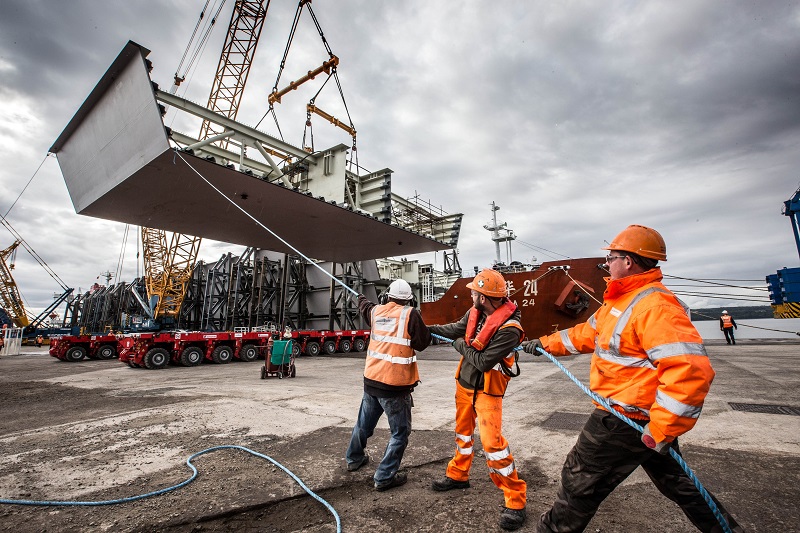
Industry figure have their say on the Autumn Statement…
Cast Consultancy: “Autumn Statement includes key recommendations from independent review into the construction industry”
The construction industry received a massive boost today after the government implemented a key recommendation from independent review into modernising the sector.
As part of the Autumn Statement, Chancellor Phillip Hammond pledged £1.4bn in funding for the National Affordable Homes Programme (NAHP).
This policy was first outlined in a recent government-commissioned review into the future of construction. The paper, titled ‘Modernise or Die’, outlined 10 main recommendations to improve the industry’s productivity and capacity to deliver the housing and infrastructure Britain needs.
BLP: “Off-site construction should be top of the list”
“The emphasis on delivering both physical and digital infrastructure in today’s Autumn Statement should create opportunities across all areas of the UK construction industry. However, it’s difficult to assess its significance in the absence of any real detail on how the industry will access the proposed £23 billion National Productivity Investment Fund.
“Considering the numerous issues that remain within the UK construction industry, namely around the national shortage of traditional skills and rising material costs, encouraging innovation within off-site construction technologies should be top of the list for the Government in delivering its ambitious new housing targets.”
CIOB: “Chancellor right to place productivity centre stage”
As the Chancellor Philip Hammond announces the 2016 Autumn Statement, the Chartered Institute of Building (CIOB) provides its reaction to the Government’s core commitments to construction and the wider economy.
David Hawkes, CIOB Policy Manager, said: “It’s clear that the Chancellor recognises that improving productivity is vital to economic prosperity. In construction, we know what can be done to improve productivity, but require certainty for firms to invest in innovation, skills and training in order to support it.
“For this reason, we welcome the £23bn National Productivity Investment Fund, to be spent on improving innovation and infrastructure over the next five years. The CIOB’s report into productivity published earlier this year found strong support from industry and MPs for the public sector to invest in construction to help increase productivity. Given this view, we are keen to ensure the fund recognises the contribution that the industry makes to improving productivity in the wider economy.
KPMG: “UK still behind on infrastructure investment”
Richard Threlfall, head of infrastructure, building and construction at KPMG UK comments on the infrastructure announcements made at the Autumn Statement. He said:
“One number matters more than any other in what the Chancellor said on infrastructure investment in the autumn statement: 1.2%. It is, as a percentage of GDP, the guidance to the National Infrastructure Commission on UK spending on economic infrastructure from 2020 to 2050.
“The Chancellor was proud to explain that it represents an increase on the current 0.8. Whilst that may be true, it is still low by international standards, and the continued focus on economic infrastructure in isolation, ignoring both social infrastructure and housing, is another missed opportunity to grasp the bigger picture. Overall, the UK spends about 2.7% of GDP on infrastructure today. Canada spends more than 4% and China at least double that.
“Today’s Autumn Statement felt fairly business-as-usual with lots of small initiatives, all welcome, but nothing transformational.”
Bond Dickinson: “Statement marks a sustained, long-term increase in infrastructure investment”
Jon Bower, Planning & Infrastructure Partner at Bond Dickinson commented: ” Perhaps the most critical announcement doesn’t relate to funding. It is the government’s announcement that it has set the National Infrastructure Commission (NIC) a fiscal remit. This new fiscal remit invites the NIC to set out recommendations assuming that spending on infrastructure will lie between 1% and 1.2% of GDP each year from 2020 to 2050. This would mark a sustained, long-term increase in infrastructure investment. With the Government making the final decision on all spending, the NIC does however have an economic framework within which to work.”
British Property Federation: “Infrastructure silver bullet very welcome”
“This Budget’s hidden gem is the spending on infrastructure to help bring forward housing sites. Infrastructure spending is housing delivery’s silver bullet and the considerable commitment to invest about £2bn a year is therefore very welcome. The £1.7bn for accelerated construction on public land will also help upscale the modular construction sector, meaning a more efficient industry and the faster delivery of homes.”
Finning UK: “Infrastructure boom must trigger earthworks technology and skills investment”
The announcement in today’s Autumn Statement of a £23bn investment fund for innovation and infrastructure, also incorporating a £1.1bn ‘shovel ready’ boost to transport network infrastructure, adds to the recent backing of HS2 and Hinkley Point C. A welcome and major boost for the construction sector.
However, delivering all of these projects successfully at the same time will be extremely challenging. With HS2 and Hinkley Point C already highlighted as projects that will be a drain on skills, technology and new equipment, it is now more important than ever that the earthworks sector makes a concerted push into new technologies and skills development.
We all recognise that attracting new operators into the industry is very difficult, so we also need to look at how the existing operator base can be supported to deliver projects more efficiently.
Barings: “Infrastructure plan upside down”
The Chancellor’s infrastructure plan is upside down. The treasury has already committed eye watering sums of money to programmes such as HS2, Heathrow & Hinkley that won’t be completed for another 20 years. Billions upon billions have been promised, with those projects costing £56bn, £19bn, and £18bn respectively.
Meanwhile only token amounts of money are being spent on practical projects that are needed today such as easing rail and road bottlenecks. For example, the £2bn announced today is fifty times smaller than the amounts committed to the 3 mega projects alone. This is despite the Treasury’s own analysis showing these smaller less glamorous projects give the bigger payback to the taxpayer. So it is a great shame that the Chancellor continues to be seduced by the glamour of the mega and ignores the utility and timeliness of the micro.
McBains Cooper: “Disappointed on training and greenbelt matters”
“We are disappointed that there was no announcement to streamline the planning process or free up land on the greenbelt – much of which is derelict land rather than areas of beauty – as that would also help the shortage of land.
“We were also disappointed not to see further investments in training and apprenticeships in the UK construction industry, as we will need to train and re-train UK people in readiness for any restrictions in the supply of skilled foreign workers following Brexit.”








